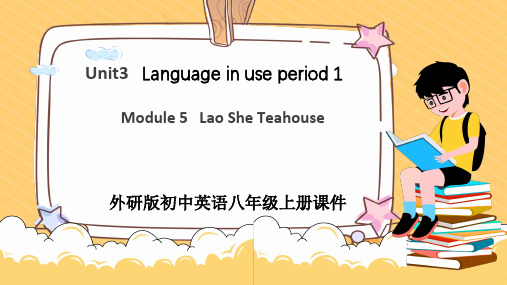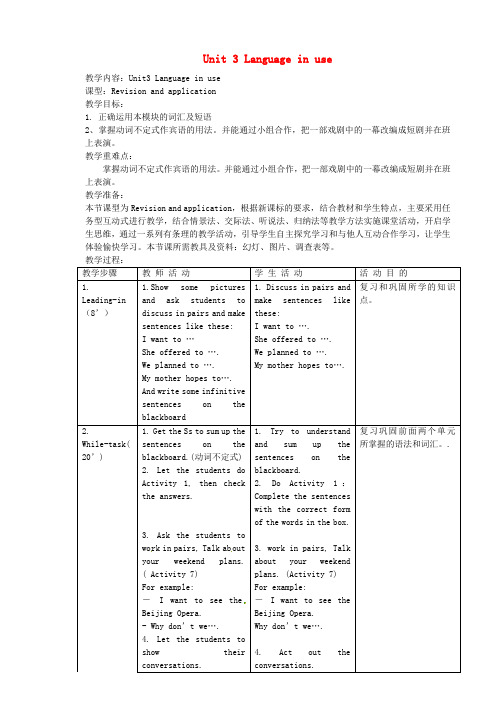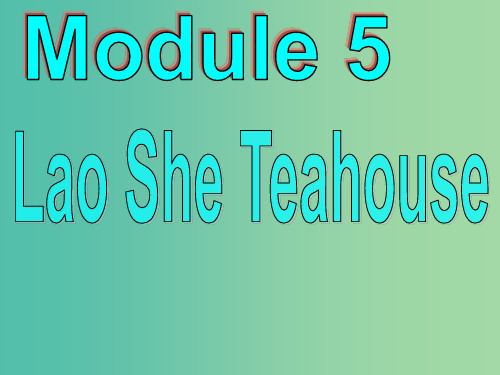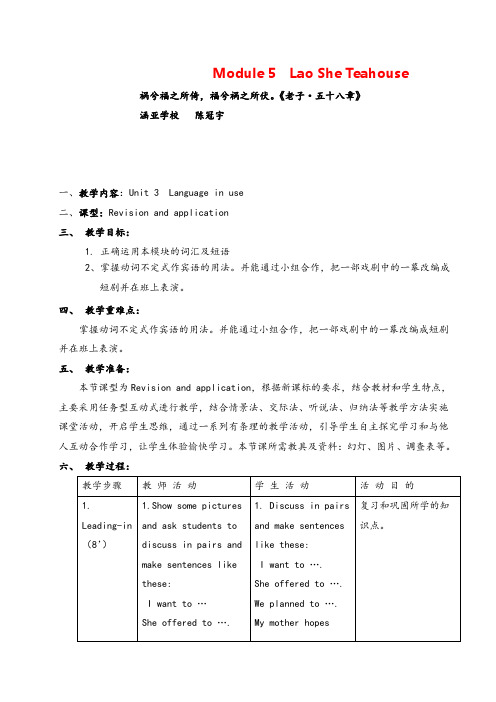外研版八年级英语上册:Module 5 Unit 3 Language in use 学案
初中英语外研版八年级上册《Module5Unit 3 Language in use》教学课件PPT

03
教学重点
Tom’s mother told him ________ eating too much meat. (黔西南)
A.stopping
B.to stop
C.stops
D.stopped
考查非谓语动词。固定短语tell sb.(not) to do sth.“告诉某人(不
要)做某事”。句意:汤姆的妈妈告诉他不要吃太多的肉。动词
不定式的两种结构
分类
构成
例句
否定结构
不定式的否定结构是“not+ Tell her not to make a noise.
不定式”。
告诉她不要吵闹。
复合结构
不定式的复合结构是“It’s+ It’s important for us to keep fit. adj.+for/of+sb. +不定式”。对我们来说,保持健康很重要。
不定式作宾语补足语。
It’s necessary for us ________ English well.(南充)
A.to learn
B.learning
Байду номын сангаас
C.learn
D.learns
此题用寻找题眼法和套用固定结构法解答。句中的It为形式主 语,动词不定式作真正的主语,套用固定结构 It’s+adj.+for sb. + to do sth.。故选A。
act common 第二十 命名 如果
would like offer 描述 结束 展示
Sentences revision
1. I w__a_n_te_d__t_o_s_e_e_ the Beijing Opera. 我想去看京剧。 2. Lingling __o_ff_e_r_e_d_t_o__ta_k_eme there.
外研版初中英语八年级上册《Module 5》模块教学设计(含课时设计)

外研版初中英语八年级上册《Module 5》模块教学设计(含课时设计)【模块学习主题】Module 5Lao She Teahouse模块学习规划课时教学流程设计Step5 A. An hour B. Two hoursC. Three hours4.Who is Lao She?A. A writerB. An actorC. A playerSs: Check the answers in groups.T: Check the answers with the Ss.(2).Ask the students to listen tothe conversation to check the truesentences, then check the answers.(Activity 3)(3)Ss listen to the tape for thethird time, and finish thefollowing sentences.①. Betty wanted to see the BeijingOpera,so Lingling____ to take herthere.②. They planned to watch for anhour,but______ _____ _____,they stayed for three hours.③. Lao She is especially_______for his play Teahouse.Ss:Check the answers in pairs.T: Check the answers with the Ss.(1). T: Organize the students toread the conversation with thevideo.(2).Ask the Ss to practice theconversation with their partners.(3) Have a competition: Ask thestudents to act out theconversation, and see which groupis the best.Post-listening.Task4: Retell the dialogue(1)Ask the students to retellthe dialogue.(2)T: Chinese culture is broad看学生是否能转述对话内容利用短文挖空形式复述对话巩固所学知识点再次训练学生对知识点的掌握。
外研版八年级英语上册 Module 5 Lao She Teahouse Unit 3 Language in use教案(1)

Unit 3 Language in use教学内容:Unit3 Language in use课型:Revision and application教学目标:1. 正确运用本模块的词汇及短语2、掌握动词不定式作宾语的用法。
并能通过小组合作,把一部戏剧中的一幕改编成短剧并在班上表演。
教学重难点:掌握动词不定式作宾语的用法。
并能通过小组合作,把一部戏剧中的一幕改编成短剧并在班上表演。
教学准备:本节课型为Revision and application,根据新课标的要求,结合教材和学生特点,主要采用任务型互动式进行教学,结合情景法、交际法、听说法、归纳法等教学方法实施课堂活动,开启学生思维,通过一系列有条理的教学活动,引导学生自主探究学习和与他人互动合作学习,让学生体验愉快学习。
本节课所需教具及资料:幻灯、图片、调查表等。
教学步骤教师活动学生活动活动目的1. Leading-in (8’)1.Show some picturesand ask students todiscuss in pairs and makesentences like these:I want to …She offered to ….We planned to ….My mother hopes to….And write some infinitivesentences on theblackboard1. Discuss in pairs andmake sentences likethese:I want to ….She offered to ….We planned to ….My mother hopes to….复习和巩固所学的知识点。
2.While-task( 20’)1. Get the Ss to sum up thesentences on theblackboard.(动词不定式)2. Let the students doActivity 1, then checkthe answers.3. Ask the students towork in pairs, Talk ab outyour weekend plans.( Activity 7)For example:-I want to see theBeijing Opera.- Why don’t we….4. Let the students toshow theirconversations.1. Try to understandand sum up thesentences on theblackboard.2. Do Activity 1:Complete the sentenceswith the correct formof the words in the box.3. work in pairs, Talkabout your weekendplans. (Activity 7)For example:-I want to see theBeijing Opera.Why don’t we….4. Act out theconversations.复习巩固前面两个单元所掌握的语法和词汇。
八年级英语上册《Module 5 Unit 3 Language in use》 外研版

2. 动词不定式的常见词组:
1. want/ would like to do sth. 2. offer to do sth. 3. decide / plan to do sth. 4. remember/forget to do sth. 5. try to do sth 6. agree to do sth. 7. hope/ wish to do sth. 8. learn to do sth. 9. Start to do 10. plan to do
2. 双宾语的常见词组:
介词 for: 1. 买:buy sb. sth. = buy sth. for sb. 2. 制作:make sb. sth. = make sth. for sb. 3. 煮:cook sb. sth. = cook sth. for sb. 4. 读:read sb. sth. = read sth. for sb.
•可 以 接 双 宾 语 的 动 词 很 多 , 常 见 的 有 : give, bring, pass, send, show, leave, buy, tell, teach, sell等。例如:
1.My brother bought me some storybooks. 我哥哥给我买了一些故事书。 2. My uncle gave me a pretty birthday present. 我叔叔给了我一个漂亮的生日礼物。
二、双宾语
例如:我递给他一个苹果。
1) I passed him an apple.
间接宾语 直接宾语 采用了“动词+人+物”的表达方式。 2) I passed an apple to him.
直接宾语 间接宾语 采用了“动词+物+人”的方式。
外研版八年级英语上册教案 Module5 Unit3 (1)

第 周 星期 年 月 日
总第 课时
课题
M5-U3 Language in use
课型
复习课
教学目的
记住并能默写本课新单词,短语和重点句型。形容词和副词最高级的构成及用法.
重点
理解内容,熟悉句型
难点
动词不定式带双宾语的动词
教具
多媒体 点读笔
教
学
过
程
教 学 内 容
个 人 备 课
一.A1,A2,A3,A4,A5,A6,A7,A8,Around the world
(一)作宾语
(1) 能够接动词不定式作宾语的有 ask, agree, decide,determine, hope, offer, plan,
promise, refuse, wish 及 would like/love 等动词,但 finish, enjoy, miss, appreciate, mind, advise, suggest 等动词后面通常只能接动名词作宾语。例如:
(your passport 是直接宾语,me 是间接宾语)
间接宾语可以用一个由to 表示动作方向或for 表示动作目标引起的短语来表示。这时,间接宾语置于直接宾语之后。我们可以把上面例句改写为:
Please show your passport to me.
常见的可以接双宾语的动词有:give, bring, lend, pass, send, show, leave, buy, tell, teach, sell 等。
Mr. Wang taught Chinese ______________________________ in London .
John bought his sister a pen .
外研版八年级英语上Module5 Unit3教案与反思

Module 5 Lao She Teahouse祸兮福之所倚,福兮祸之所伏。
《老子·五十八章》涵亚学校陈冠宇一、教学内容:Unit 3 Language in use二、课型:Revision and application三、教学目标:1. 正确运用本模块的词汇及短语2、掌握动词不定式作宾语的用法。
并能通过小组合作,把一部戏剧中的一幕改编成短剧并在班上表演。
四、教学重难点:掌握动词不定式作宾语的用法。
并能通过小组合作,把一部戏剧中的一幕改编成短剧并在班上表演。
五、教学准备:本节课型为Revision and application,根据新课标的要求,结合教材和学生特点,主要采用任务型互动式进行教学,结合情景法、交际法、听说法、归纳法等教学方法实施课堂活动,开启学生思维,通过一系列有条理的教学活动,引导学生自主探究学习和与他人互动合作学习,让学生体验愉快学习。
本节课所需教具及资料:幻灯、图片、调查表等。
六、教学过程:达标训练题一、单项选择。
()1. Let’s _________ for a walk, shall we?- ____________,A. to goB. goingC. goD. gone( ) 2. The boss made the workers ________ the job on time.A. finish finished C. finishes D. to finish( ) 3. It’s necessary for us __________ Mont Yuntai.A. go climbingB. go to climbC. to go climbingD. goes climbing( ) 4. - Mary, What’s that? - A card. Linda ______ it _______me yesterday.A. sent ; forB. sent ; toC. gives ; forD. gives; to ( ) 5. I decide ________ a translator in the future.A. beB. to beC. beingD. am二、阅读理解Most people make their living(谋生)with their hands, but Bob makes his living with his feet.Bob’s story began in a small city in England. His parents were poor. Seven people lived in a small house. Bob had no place to play but on the street.Bob’s father often played football. Little Bob wanted to play football, too. So his father made a soft (柔软的)ball for him to kick. It was a sock full of old cloth. He kicked it every day.At last , Bob learned to kick a real football. And after a few years he could play football very well.根据短文内容,选择最佳答案。
外研版八年级英语上册教案 Moddule 5 Unit 3-2
Module 5 Lao She TeahouseUnit 3 Language in use 2一、教学目标1. 熟练掌握下列词汇和短语:audience, survive, take place等。
2. 掌握本模块的重点句型。
3. 能够了解西方剧院的起源,读懂介绍古希腊剧院概况的文章。
4. 能够选一部戏剧中的一幕改编成短剧并表演。
二、教学重点及难点重点:1. 掌握本单元的单词、短语、句型及语法。
2. 能够了解西方剧院的起源,读懂介绍古希腊剧院概况的文章。
难点:选一部戏剧中的一幕改编成短剧并表演。
三、教学准备1. 多媒体设备和课件;2. 设计课后巩固练习;3. 教学图片。
四、教学过程Step 1 RevisionPractise and review the grammar.【设计意图】通过练习检测学生对于本模块语法的掌握情况。
Step 2 Warming-up1. Look at the pictures and talk about them.2. Look at the picture and learn something about it.【设计意图】通过展示世界著名剧院的形式引入本课,拓宽学生的眼界,吸引学生的注意力,并拓展课外知识。
Step 3 PracticeAround the world1. Ask Ss to read the passage and answer the questions.2. T checks the answers with the whole class.【设计意图】帮助学生了解西方剧院的起源和古希腊剧院的概况,扩大知识面,加强跨文化交际的能力。
3. Let Ss do some exercises to consolidate what they have learned.(1) Choose the correct answer.(2) Complete the sentences with the correct form of the words. 【设计意图】通过练习巩固本课所学知识,考查学生对知识的掌握程度。
外研版八年级英语上册 Module 5 Lao She Teahouse Unit 3 Language in use教案(2)
Unit 3 Language in use教案ⅠTeaching modelRevision and applicationⅡTeaching methodFormal and interactive practiceⅢ Teaching aims1. Function: Talking about intentions and plans.2. Structure: Infinitive structures (1): infinitives as objects; verbs followed by infinitives.3. Around the world: Theatres4. Task: Acting out a scene from a play.Ⅳ Teachi ng aidsTape recorder, OHP, handoutsⅤTeaching StepsStep 1 Revision1. Talk about Lao She’s Teahouse.2. Work in pairs to review the text of Unit 1 and Unit 2Step 2 Language practice1. Read through the example sentences in the box with the whole class.1) I wanted to see the Beijing Oper a.2) Lingling offered to take me there.3) We only planned to watch for an hour.4) We decided to stay for three hours.5) I hope to understand more next time.2. Work in pairs.3. 动词不定式词组want to do sth.offer to do sth.decide to do sth.remember to do sth.forget to do sth.stop to do sth.agree to do sth.hope to do sth.like to do sth.Step 3 Complete the sentences.1. Ask the students to read through the words in the box in Activity 1.go see spend stay teach write2. Ask the students to read through the sentences in Activity 1.Do you want to go to the teahouse?1) We decided ____________ at home because it was raining.2) Lao She started ____________ Chinese in London in 1924.3) I tried ____________ poems.4) They plan _________ the film tomorrow.5) I want __________ my holiday in Beijing.3. Complete the sentences with the correct form of the words in the box.4. Ask the students to check with a partner.5. Check the answers:Keys: 1. to stay 2. to teach 3. to write 4. to see 5. to spendStep 4 Complete the note.1. Ask the students to read the conversation in Activity2.Betty: I’d lo ve to see the Beijing Opera again.Lingling: Would you like me to take you? Where can we go this time?Daming: I know! You can go to Mei Lanfang Theatre.Lingling: Good idea! Let’s go next Saturday, Betty.2. Complete the note with the correct form of the words in the box.advise decide offer wantBetty (1)__________ to see the Beijing Opera again. Lingling (2)__________ to take her. Daming (3)___________ them to go to Mei Lanfang Theatre. Lingling (4)__________to go next Saturday.3. Ask the students to check with a partner.4. Check the answers:Keys: 1. wanted 2. offered 3. advised 4. decided5. Read the conversation together.Step 5 Complete the passage.1. Ask the students to read through the passage in Activity 3.Lu Xun is one of the greatest writers of modern China. He was born in Shaoxing, Zhejiang Province, in 1881. At first, Lu Xun hoped (1) __________ (help) the Chinese people become healthy and strong, so he decided (2) _______ (be) a doctor. After a few years, he started (3) _________ (write) short stories because he wanted (4) ________ (teach) people about society. One of his most famous stories is The True Story of Ah Q. It describes the hard life of Ah Q and makes people (5) ______ (think) about society. In the 1920s, people began to translate his works into English.2. Complete the passage with the correct form of the words in brackets.3. Ask the students to check with a partner.4. Check the answers:Keys: 1.to help 2. to be 3. to write 4. to teach 5. thinkStep 6 Complete the passage.1. Ask the students to read through the words in the box in Activity 4.cheer magic take place theatre wonderful2. Ask the students to read through the passage in Activity 4.We went to the (1) ________ last night to see a play. I had a (2) __________ evening. The play was very good and all the actors were excellent. The story (3) __________ in a small village in China. It was all about an old box of gold! The box was a (4) _______ box and was difficult to open. The play was very interesting, and everyone (5) _________ at the end of the play!3. Complete the passage with the correct form of the words and expression in the box.4. Ask the students to check with a partner.5. Check the answers:Keys: 1. theatre 2. wonderful 3. took place 4. magic 5. cheeredStep 7 Listening practice.Step 8 Listening practice.1. Ask the stu dents to read through the sentences in Activity 6 individually.1) Steve went to Shakespeare’s Globe Theatre last night.2) Vicky offered to take Steve to the theatre.3) Steve didn’t try to understand the words.4) Vicky hopes to see her favourite play.5) Vicky thinks her parents will take her to the theatre.2. Play the tape.3. Listen again and check (√) the true sentences.4. Ask the students to check with a partner.5. Check the answers:Step 9 Work in pairs.1. Talk about your weekend plan. Use the words and expressions in the box to help you.hope how about let’s want why don’t we why not would like — I want to see the Beijing Opera.— W hy don’t we …?2. Now act out your conversation for the class.Step 10 Reading1. Ask the students to read the passage in Activity 8.2. Read through the questions in Activity 8.1) You would find the passage in ___________.a) a book b) a school newspaper c) a magazine2) The writer ____________.a) liked the play b) didn’t like the play c) didn’t say he liked it or not3) The actors and actresses in the play wore ____________.a) the same clothes as todayb) their best clothesc) clothes of the first half of the twentieth century4) Li Nan is ____________.a) a famous actor b) a student c) an actress3. Choose the correct answer.4. Ask the students to check with a partner.5. Check the answers:Keys: 1. b 2. a 3. c 4. bStep 11 Around the world: Theatres1. Ask the students to look at the picture and discuss what they can see.2. Read through the information with the whole class.Western theatre started in Greece, around 600 BC. The theatres were very big. About 15,000 people could watch a play at the same time. The audience sat on stone seats to watch the performances. Some of the theatres survive, as do same of the plays by ancient Greek writers. People still watch these plays today.3. Talk something about “Theatres”.Step 12 Module task: Acting out a scene from a p lay.1. Work in groups. Find a play. Think about these questions.1) Where does it take place?2) Who is in it?3) What is the story?4) What are the special moments in it?2. Choose a scene and practice it.3. Act out the scene in front of the class.Step 13 Grammar动词不定式的用法(1)动词不定式是由“to+动词原形”构成 (有时可以不带to)。
外研版英语八年级上册M 5 Unit 3 教案
Unit 3 Language in useⅠTeaching modelRevision and applicationⅡTeaching methodFormal and interactive practiceⅢTeaching aims1. Function: Talking about intentions and plans.2. Structure: Infinitive structures (1): infinitives as objects; verbs followed by infinitives.3. Around the world: Theatres4. Task: Acting out a scene from a play.ⅣTeaching aidsTape recorder, OHP, handoutsⅤTeaching StepsStep 1 Revision1. Talk about Lao She’s Teahouse.2. Work in pairs to review the text of Unit 1 and Unit 2Step 2 Language practice1. Read through the example sentences in the box with the whole class.1) I wanted to see the Beijing Opera.2) Lingling offered to take me there.3) We only planned to watch for an hour.4) We decided to stay for three hours.5) I hope to understand more next time.2. Work in pairs.3. 动词不定式词组want to do sth.offer to do sth.decide to do sth.remember to do sth.forget to do sth.stop to do sth.agree to do sth.hope to do sth.like to do sth.Step 3 Grammar动词不定式的用法(1)动词不定式是由“to+动词原形〞构成(有时可以不带to)。
八年级英语上册 Module 5 Lao She's Teahouse Unit 3 Language in use教案2 (新版)外研版
Language in useTarget language 目标语言1. Words & phrases生词和短语full, silver, enjoyable, performance2. Key sentences重点句子She wanted to see some Beijing Opera.My parents offered to take us there.My parents agreed to take us.We decided to stay for two hours.I hope to understand more next time.Ability goals 能力目标Enable students to use Verbs followed by infinitivesTeaching important/difficult points 教学重难点Verbs which are followed by infinitive.Teaching methods教学方法Task-based learning.Teaching aids教具准备Some pictures and a tape recorderTeaching procedures and ways教学过程与方式Step I RevisionIn this procedure, check the homework and then ask students to talk about Lao She’s Teahouse.Have a dictation of some new words and expressions.Ask some students to read the passage about his or her favourite film and play. T: Let’s come to Exercise 4, talk about something about Lao She’s Teahouse. One sample:The play takes place in a tea house. It asks us to see the teahouse as the centre of the neighbourhood….Step II VocabularyIn this procedure, ask students to finish activities 8 and 10 by doing pair work. Ask the students to complete the sentences and passage with the correct form of the words and expressions in the box.Check the answers by themselves first, then go through the answers with the students.Step III GrammarIn this procedure, revise the important grammar points of this module. Do pair work to practise verbs followed by infinitives.T: Look at page 84, activity 1. Let’s work in pairs to complete t he sentences with the correct form of the words in the box.Sample conversation:S1: I’d like to see Beijing Opera one day.S2: He wanted to see Beijing Opera one day.S1: Yes. Let’s go to the opera.S2: They agreed to go to the opera.Ask some pairs to act before the class. Then go through the answers with the students. T: Well done! Let’s come to activity 2. Please complete the sentences with the correct form of the words in the box.Give the students a few minutes to write the correct answers.Ask some pairs to read their answers. Go through the answers with students. Then go on with activity 3.Step IV ListeningIn this procedure, ask students to listen to the conversation and check the true sentences in activity 6.Go through the answers with students and play the tape again to ask them to check their answers.Step V Speaking and writingIn this procedure, ask students to do activities 7 and 9.T: Sometimes we can express our feelings through what we say. Let’s come to activities 9. Work in pairs, match sentences 1-4 with sentences a-d.One sample:S1: It’s lovely to see you!S2: I’m very happy.S1: The food here is excellent.S2: It’s delicious.…Then ask students to work in pairs and write a short conversation using the sentences in activity 9 and the verbs hope, want, would like.One sample conversation:S1: It’s lovely to see you!S2: Me too!S1: Would you like to go the park?S2: I want to, but I must do my home work.S1: It’s a pity. I hope to go with you next time.S2: OK. Thank you all the same.Then ask some pairs to act out the conversation.Step VI Module taskIn this procedure, ask students to read Around the world first. Make sure they understand the meaning of the passage. Explain some difficult sentences to the students if necessary.Then ask them to work in groups and write a scene from a play.Give the students a few minutes to write the conversation. Ask some groups to actout the conversation in front of the class.Step VII HomeworkAsk students to1. revise this Module.2. finish the activities in the workbook.Teaching resources教学资源库I. 重点知识详解(1) 不定式作宾语接不定式的动词主要有:want, like, would like,decide,hope,help,learn,mean,plan,seem,wish, fail等。
- 1、下载文档前请自行甄别文档内容的完整性,平台不提供额外的编辑、内容补充、找答案等附加服务。
- 2、"仅部分预览"的文档,不可在线预览部分如存在完整性等问题,可反馈申请退款(可完整预览的文档不适用该条件!)。
- 3、如文档侵犯您的权益,请联系客服反馈,我们会尽快为您处理(人工客服工作时间:9:00-18:30)。
Module 5 Unit3 Language in use【学习目标】1.掌握并正确运用下列单词及短语:Modern ChinaA madman’s Diary, translate into, cheer, in Greece, audience, performance, ancient2.掌握动词不定时作宾语和双宾语的用法。
【学习过程】一、根据句子以及首字母补全单词1.–_______ (几乎)nobody in his village could go to school 20 years ago.2.There’s a large _____(观众) in the hall .3.It’s _____(不可能的) for little Ann to finish her homework in ten minutes.4.In the 1960s,some people began to t______(翻译)Lu Xun’s works into English.5.This made the story very r_____(真实的)but it is so _________ (不同的)from today. .二、单项选择( ) 1.It’s _______ to teach a man fishing than to give him fish.A.moreB. betterC. goodD. best( ) 2.—I feel tired and sleepy.—Why not stop______?A. to relaxB. relaxingC. restingD. to work( ) 3.My watch is broken. I want to know how to make it ______.A. workB. to workC. walkD.to walk( ) 4.Today the forests have almost gone. People must _______ down too many trees.A. stop from cuttingB. stop to cutC. be stopped from cuttingD.be stopped to cut( ) 5 John asked David how _______ Christmas.A. celebratingB. to celebrateC. to be celebrateD. celebrated()6.He was _______ sad at the bad news that he could hardly say a word.A. veryB. soC. tooD. much()7.You look tired now. You _______ stay at home and have a rest.A. had toB. had betterC. would like toD. would rather()8.—John, will you please _______the blackboard now? It’s your duty.—OK.A. not cleanB. not to cleanC. to cleanD. clean()9.—Her radio is too loud, isn’t it?—Yes. Let me tell her_________.A. to turn it upB. turn up itC. turn it downD. to turn it down()10.My grandfather wants ____around the world because he enjoys ________ new places.A. traveling; seeingB. to travel; to seeC. to travel; seeingD. travelling; to see()11.She _______ in the sports meeting and won the first medal.A. took partB. joinedC. attendedD. entered()12 I am excited to see Yang Li, a _______ astronaut.A.38-year-old B.38-years-old C.38 year old D.38 year old ()13.They could go to school _______ the help from Project Hope.A. becauseB. because ofC. soD. since()14.Don’t worry. We have _______ tim e to do the job.A. enoughB. fewC. manyD. little三、短语翻译1.主动提出做某事_____________ 2.把……译成英语____________3.计划做___________ 4.以…….著名___________5.把某人带到___________ 6.希望做某事______7 向某人出示某物________________ 8.发生___________9.阿Q 正传______________ 11.观看表演__________12.狂人日记________ 13.描写阿Q的艰难的生活______四、词组1.Plan /hope/ decide /agree/ offer to do sth2.Happen/ take place3.Be named4.One of + Pl5ask /want / invite /allow/ sb.to do sth.五、型句子必背1.It describes the changes in Chinese society.2.The play has three acts and shows the lives of common people in China from the end of the 19th century to the middle of the 20th century.3.He was named “People’s Artist” and described as a great master of language.4.It was almost impossible to understand the actors and actresses.六、语法点拨2. 双宾语:当动词有两个宾语时,结构:动词+人+物,我们把这种结构叫双宾语。
人被称作七、根据汉语提示完成句子1.Do you ____ (想去钓鱼) with me this afternoon ?2.You can ask Mr. Brown ___ (回答) the question.3.The boy____ (试图爬) the tall tree, but he could not .4.Please _______ ( 记住关上) the window when you leave the room .5.I _____ (希望) to be a teacher in the future.八、给动词的适当形式填空1.I hope ____ (see) her soon.2.Sports help _____ (keep) people healthy.3.I’m learning ______ (speak) English4.I found it difficult ____ (work) out the math problem.5.He promised ____ (not tell) anyone about it.6.I have lots of clothes _____ (wash).7.They told us ________ (not spit) everywhere.8.My parents agrees _____ (help) to borrow books.9.There’s no difference between the two words.I really don’t know which ____ _____ (choose).10.Do you want____ (play) tennis with me on Saturday morning?11.Teachers often tell us ____ (not swim) in the river after school.12Lu hoped ___ (help) Chinese ___ (become) strong, so he decide____ (be) a doctor.九、完形填空Not everyone has a chance to be a detective. But I got one when I was thirteen years old.It happened in 1988.One afternoon, I was walking down the street when I saw my father’s new car. I 1 to see my father, but to my surprise, I saw a young woman driving instead.“She has stolen my father’s car.” I thought. So I quickly stopped a taxi and got in. I sa id to the driver, “Follow that new car 2” and I told him why.The taxi driver had a car phone, so I asked him to call the police. Soon we heard the 3 of a police car and its loudspeaker. The police told the woman to stop her car. Our car came to stop, too. I 4 right then an d said to the woman, “It’s not your car. It’s my 5”The woman smiled and said, “Oh, you’re Mr Johnson’s younger son, right? I’ve ever seen your photo in your father’s office.”Before I could say 6 word, the woman explained that she was my father’s new assistant(助手). My father had asked her to take his computer to the shop to have it 7 . He lent her his car. After hearing her words, we called my father and he told us what she said was 8 The police and the taxi driver laughed.I 9 very sorry. It was both the first and the last time I worked as a 10 Don’t you think my story is funny?1.A. expect B .expected C. think D. thought2.A .after B.in front C. at the back D. at the back of3.A. noise B. voice C. cry D. sound4.A. got in B. got into C. got out D. got away5.A. father B. mother C. mother’s D. f ather’s6.A. another B. other C. else D. others7.A, repair B. repaired C. repairs D. repairing8.A. wrong B. really C. true D. truly9.A. felt B. feel C. fell D. fallen10.A. student B. policeman C. driver D. detective。
